Debra H. Goldstein's Blog, page 26
August 13, 2017
Do You Love Me? (Click here for Comments)
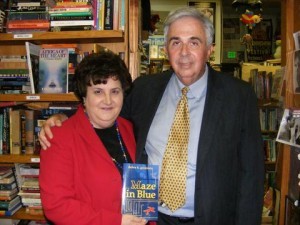 Do You Love Me? by Debra H. Goldstein
Do You Love Me? by Debra H. Goldstein
Many of you know I love Broadway shows. There is a Facebook test making the rounds where one identifies how many, out of one hundred shows, one has seen either on Broadway or in some other theater production. I’m so nerdy, my score was over 80 – and that is not counting if I’ve seen a show more than once.
For example, I saw Fiddler on the Roof on Broadway with Zero Mostel and later Herschel Bernardi, in London with Topol, and at least twice in community theaters. As today is Joel and my anniversary (it really is today – August 14 – 34 years), one of the songs that Tevye, the main character, and his wife, Golde, sing to each other comes to mind. The song, Do You Love Me?, is sung after Tevye gives permission to one of his daughters to marry a man she loves. He gives his blessing even though it means her life will be difficult and located in a geographic area where Tevye may never see her again. Confused that marriages are based upon love rather than how his was arranged, he raises the question with Golde whether she loves him.
In the song, they sing of how nervous they were on their arranged wedding day, but how they were assured it would work out. Tevye begs his wife to answer whether she loves him. She replies by listing all the things she does from washing his clothes, making him dinner, milking the cow, giving him children and sharing his bed. Eventually they conclude that after twenty-five years, they love each other.
The song is simple, but it reflects the reality of marriage. Unlike fairy tales, marriage isn’t “They Lived Happily Ever After.” Marriage can be the special wonder of physical attraction and the honeymoon period, but it also has moments of reality that aren’t always beautiful highs. As Golde sings, the day to day reality of marriage includes basic life activities that aren’t romantic. The key is whether, as a couple, one gets through them together. It is the single memories two separate people unite to create.
Sometimes we take these moments for granted. We’ve been there, done that, and gotten used to each other’s habits and interests. There are many distractions that sometimes result in the relationship becoming secondary or even stale. That’s when we stop and take stock of why we fell in love and married.
I could ask Joel if he loves me, but I know the answer is the same as mine. After thirty-four years, it’s nice to know.
The post Do You Love Me? (Click here for Comments) appeared first on Debra H. Goldstein.
July 30, 2017
Day of the Dark Anthology – Part II (click for comments)
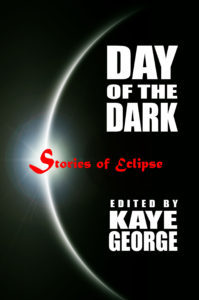 Day of the Dark, an anthology of eclipse related short stories, was published by Wildside Press on July 21, one month before North America experiences its first contiguous total eclipse in forty years. In my last “It’s Not Always a Mystery” blog, I introduced you to the anthology’s creator, Kaye George, my short story, A Golden Eclipse, and ten more of the twenty-four authors and their stories. Today, it is my pleasure to introduce you to the remaining twelve authors and their stories.
Day of the Dark, an anthology of eclipse related short stories, was published by Wildside Press on July 21, one month before North America experiences its first contiguous total eclipse in forty years. In my last “It’s Not Always a Mystery” blog, I introduced you to the anthology’s creator, Kaye George, my short story, A Golden Eclipse, and ten more of the twenty-four authors and their stories. Today, it is my pleasure to introduce you to the remaining twelve authors and their stories.
L.D. Masterson lives in Dayton, Ohio and writes in a variety of genres. Her story, Picture Perfect, addresses the obsessive need of a photographer to outshine a rival. This obsession leads to dastardly deeds during a solar eclipse. But what will be revealed in the dark? http://ldmasterson-author.blogspot.com
An Eclipse of Hearts, by Dee McKinney, is a dark supernatural tale. It features Dr. Enid Seward, the great-grand-daughter of alienist Jack Seward from Dracula, who has her hands full when the birth rate spikes during an eclipse in Vancouver. When one of the happy new moms recall getting pregnant, Enid must consult the Seward family journals for clues to find the forgettable lover before he causes any more amorous mayhem. Characters from this story are featured in the novel that Dee, a full time-college professor, associate dean and part-time writer, presently is querying. https://www.goodreads.com/author/show/172149/Dee.McKinney
2013 Shamus winning novelist and 2015 Anthony and Macavity nominated short story writer Paul D. Marks is the author of the dark tale, Blood Moon. www.PaulDMarks.com His facebook author page is www.facebook.com/paul.d.marks
Nupur Tustin, author of A Minor Deception, the first in the Joseph Haydn Mystery series, offers a different eclipse interpretation in The Baker’s Boy. In this story, Haydn, a struggling young composer, learns his brother has eclipsed him by obtaining a lucrative position as a member of a wealthy prelate’s orchestra. His world is overturned. Hoping to reverse his fortunes, he purchases a small scrap of linen, torn apparently from the Lord’s Shroud. When the baker’s boy, who’s also purchased a piece of the same shroud, is arrested for murdering his master, Haydn’s faith wavers. Can a scrap of linen save an innocent boy from the gallows and Haydn from a life in the Church? Or are the baker’s boy and his own musical ambitions equally condemned to die? http://ntustin.com
Agatha Award-Nominated writer Harriette Sackler’s short stories have appeared in a wide variety of mystery fiction anthologies. She is also a Co-Publisher and Editor of Level Best Books. Her story, Rays of Hope, focuses on a young woman’s attempt to uncover the truth about a tragedy that occurred in her early childhood. Julie Spencer’s memory and her obsession to find closure combine to bring a satisfying story to readers.
In Flying Girl, Toni Goodyear uses a child’s point of view to tell a feel-good story. Her Flying Girl speaks to the mystical, magical heart in all of us. Pretty good for a person who, in real life, loves to hike and camp, but who has trouble finding West, even at sunset.
Katherine Tomlinson is a former reporter who prefers making things up. Her short fiction has appeared online and in print in a number of anthologies; her nonfiction has been published by St. Martin’s Press, Regan Books, and Croce Publishing. She also writes fantasy and science fiction as “Kat Parrish.” The Path of Totality is a politically charged story about ignorance and its collision with science as the eclipse unfolds against the background of a post-rational America.
Three weeks before her due date, Mandy Malone learns of a disturbing connection between pregnant women and the upcoming solar eclipse in the small Ohio college town of Jericho. With that premise, Margaret S. Hamilton creates Baby Killer, a gripping tale. Margaret S. Hamilton has published short stories in Mysterical-E, Kings River Life, and the Darkhouse Destination: Mystery! anthology. She was a finalist in the 2016 Southern Writers Magazine short story contest. Margaret writes a monthly blog for Writers Who Kill and is a member of Sisters in Crime and Mystery Writers of America. She is completing her debut contemporary cozy novel, Curtains for the Corpse, which is set in the fictional Jericho, Ohio. Margaret lives in Cincinnati. https://margaretshamilton.wordpress.com/
M. K. Waller, author of I’ll Be a Sunbeam, is a former librarian and paralegal whose stories have been published in the crime fiction anthology Murder on Wheels and in Mysterical-E. A resident of Austin, she will watch the 2017 eclipse from Kansas City but hopes to see one scheduled for 2024 from her front yard. In her story, small-town librarian Marva Lu Urquhart, who first appeared in Murder on Wheels, finds, once more, that the best-laid plans can go astray, especially when it’s too dark to see what you’re doing.
In a recent Travel with Kaye blog, anthology editor Kaye George wrote that To the Moon and Back by Kristin Kisska portrays mother-daughter love being examined at the time the eclipse is approaching. In Date Night, Cari Dubiel takes us on a journey which involves more than traveling through space while Laura Olds’ Ocean’s Fifty opens our eyes to a unique swindle.
Although I may not find a way to see the eclipse, it will be okay. I’ll be holed up somewhere reading Day of the Dark.
The post Day of the Dark Anthology – Part II (click for comments) appeared first on Debra H. Goldstein.
July 16, 2017
Day of the Dark Anthology!!!! – Part I (Click for Comments)
 It hasn’t happened in almost four decades. For some, August 21, 2017 will be the only time in their lives to experience a total solar eclipse passing over the contiguous United States. August 21, will you be somewhere between Oregon and South Carolina, wearing proper eye protection, watching the moon pass between the earth and the sun? If not, beginning July 21, when Wildside Press releases the eclipse-related short story anthology, Day of the Dark, different versions of the phenomenon can be experienced anytime thanks to the efforts of twenty-four authors and the creative thinking of author/editor Kaye George.
It hasn’t happened in almost four decades. For some, August 21, 2017 will be the only time in their lives to experience a total solar eclipse passing over the contiguous United States. August 21, will you be somewhere between Oregon and South Carolina, wearing proper eye protection, watching the moon pass between the earth and the sun? If not, beginning July 21, when Wildside Press releases the eclipse-related short story anthology, Day of the Dark, different versions of the phenomenon can be experienced anytime thanks to the efforts of twenty-four authors and the creative thinking of author/editor Kaye George.
Kaye is the prolific author of ten mystery novels in four series, numerous short stories and the recipient of three Agatha nominations. Murder on Wheels, an anthology she helped put together with the Austin Mystery Writers, won the 2016 Killer Nashville Silver Falchion Award. In The Darkest Hour, her Day of the Dark story, characters Tom and Arden live in the path of totality, just south of Knoxville. When Tom decides to rent out the spare bedroom to eclipse viewers, they come bringing unexpected problems and not everyone survives. http://kayegeorge.com
My story, A Golden Eclipse, a tongue in cheek examination of a young law enforcement agent’s plan to take down a con man also is featured. The story reminds us that no matter what the event, there are always people ready to use any occasion to take advantage of others. www.DebraHGoldstein.com
Because I’m impressed with the quality of writing found in Day of the Dark, I’m going to spend the remainder of this week’s “It’s Not Always a Mystery,” blog, as well as my July 31st blog, telling you about the other authors and their stories.
Carol L. Wright, the author of The Dark Side of the Light, is a lawyer, book editor and academic who writes short stories in a variety of genres. Her mystery, Death at Glenville Falls, the first of the Grace McIntyre Mysteries, comes out in August 2017. In The Dark Side of the Light, Carol shows us how a young woman plans the perfect way to reveal an exciting secret to her husband on eclipse day. What she doesn’t know is that she is in the dark about something crucial he hasn’t shared with her. When each finally learns the other’s secret, they discover what is truly important, even though nothing will ever be the same. http://carollwright.com
Awaiting the Hour by Joseph Walker is a poignant tale of gentleness and brutality, side by side. It is inspired by research Joseph did on how to prepare and where to go to watch the eclipse. As he read about the eclipse, Joseph, a teacher of college composition and literature courses and a member of Mystery Writers of America, realized some people have planned for the eclipse for years, even if it means traveling thousands of miles to make sure of seeing it. That prompted him to wonder about the type of man who’s been looking forward to the eclipse forever. He questioned why it would be important to him, how it shaped his life, and what exactly such a man would be prepared to do if, at the last minute, someone threatened his ability to carry out his plan. https://www.amazon.com/-/e/B00rTYF3S6
John Clark is a retired Maine librarian with a background in mental health and library systems software support who has been writing for newspapers and magazines for twenty years. He has one published book and has had several short stories featured in Level Best anthologies. Although he is reads avidly, writes reviews, gardens, and enjoys his granddaughter, in Relatively Annoying, he produces a chilling tale which combines horror and sci-fi elements with a partial eclipse and other heavenly happenings. As he notes, the Maine woods are lovely, dark and deep, but when something is stolen and hidden in them, what happens because of the eclipse has far-reaching and frightening consequences. https://www.facebook.com/wizardofhartland
The prophecy “Near the Devil’s table, between the Devil’s backbones, blood shall seep to the earth. As the moon blots out the sun, the powerful reckoning shall be birthed” is central to Melissa H. Blaine’s The Devil’s Standtable. In the story, Department of Prophecies Agent Poppy Inca just wants to watch the solar eclipse, but she quickly finds herself in the middle of a prophecy showdown she must interpret before her blood is the one spilled. Although Melissa doesn’t worry about spilled blood as much in real life, she spent hours exploring the trails of Giant City State Park and its surrounding areas while earning a master’s degree in sociology at SIU-C. Now living in Michigan, Melissa enjoys visiting cemeteries, hiking with her dog, and tracking down local legends. www.Melissahblaine.com
A former Level Best Books co-editor/publisher and award-winning writer of biographies and books about American history, Leslie Wheeler, has authored three published Miranda Lewis ‘living history” mysteries and numerous essays and stories. In Chasing the Moon, she examines how the total solar eclipse touches the lives of four people living along the path of totality: a single mother with a young son, who, together with her mother, runs and Airbnb in Madras, Oregon; a middle-aged man participating in the annual Little Green Men Festival in Hopkinsville, Kentucky; a down-on-his-luck musician in Nashville, Tennessee; and, a fiercely independent elderly African American woman in Columbia, South Carolina. www.lesliewheeler.com
A sampling of other stories included in Day of the Dark are the political Norse historical, Torgnyr the Bastard, Speaker of Law by Suzanne Berube Rorhus; Cheryl Vause’s psychological suspense tale, Black Monday; the quirky swindle tale, Open House by Bridges DeiPont, Women’s Work, a historical mystery set in the DC area in 1875 by K.B. Inglee; and suspenseful Ascension into Darkness by Christine Hammar.
Read about the remaining authors and stories in my July 31, 2017 “It’s Not Always a Mystery” blog.
The post Day of the Dark Anthology!!!! – Part I (Click for Comments) appeared first on Debra H. Goldstein.
July 2, 2017
Guest Blogger: Bryan E. Robinson, Ph.D. – Writing “As If” to Reignite your Creative Mojo (click here for comments)
 Writing “As If” to Reignite Your Creative Mojo by Bryan E. Robinson, Ph. D.
Writing “As If” to Reignite Your Creative Mojo by Bryan E. Robinson, Ph. D.
Act as if you’re a writer. Sit down and begin. Act as if you might just create something beautiful, and by beautiful I mean something authentic and universal. —Dani Shapiro
Raise your hand if you’ve ever been unsure which direction to take with your writing, if self-doubt has nipped at your heels, or if you’ve landed in the clutches of writer’s block or “second book syndrome.”
I thought so.
Most of us who’ve written for any length of time have gotten stuck somewhere along the way. But there’s good news. Twelve Step programs have thrown a phrase around for years called “acting as if.” This principle can help us get through periods of writing paralysis.
What does it mean to act as if? Acting as if is a simple, yet powerful tool that says we can create outer circumstances by acting as if they’re already true. We give ourselves to a certain performance as if it’s how we feel. When we act as if, the mood we pretend becomes a reality.
Suppose we’re angry and unforgiving but want to be forgiving toward someone who offends us. We can come to feel forgiving by acting as if we are forgiving. Perhaps we’re feeling cold and detached but want to be happy for a fellow author’s good news. We can be happy by acting as if we are happy. Maybe we have difficulty getting words on the page, but instead of fighting tooth and nail, we convince ourselves it’s easy, write as if it’s easy, and tackle the difficulty with ease.
Authors of all genres have used this method to jumpstart their writing mojo. The Playwright Tennessee Williams said, “I believe the way to write a good play is to convince yourself it is easy to do then go ahead and do it with ease.” Screenwriter Steven Pressfield also recommends the as if approach: “You and I as writers must write as if we were highly paid, even though we may not be. We must write as if we were top-shelf literary professionals, even though we may not (yet) be.”
When I wrote Limestone Gumption: A Brad Pope and Sisterfriends Mystery and Daily Writing 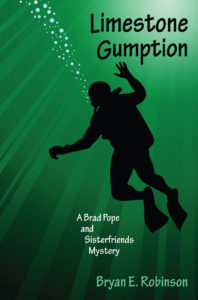 Resilience: 365 Meditations and Inspirations for Writers, I too, use the as if strategy in my fiction and nonfiction work, writing as if my books will be on the shelves beside Lee Child or J. K. Rowling, as if Steven Spielberg will beat down my door to sign me for the screenplay. I’m still waiting for Hollywood to call, but I can testify to the effectiveness of this strategy.
Resilience: 365 Meditations and Inspirations for Writers, I too, use the as if strategy in my fiction and nonfiction work, writing as if my books will be on the shelves beside Lee Child or J. K. Rowling, as if Steven Spielberg will beat down my door to sign me for the screenplay. I’m still waiting for Hollywood to call, but I can testify to the effectiveness of this strategy.
There’s scientific evidence for the old adage when we act as if, the rest of us follows suit. It’s based on the mind-body connection. The cells of our bodies constantly eavesdrop on our thoughts from the wings of our minds. When we’re doubtful or disappointed about our writing, our bodies go with the downturn of our feelings, making us feel worse. We might hold our heads down or slump when we walk.
In the words of motivational writer Tony Robbins, “If you change your physiology—that is your posture, breathing patterns, muscle tension, facial expressions, gestures, movements, words, vocal tonality—you instantly change your internal representations and state.” For example, making the facial expression of a smile can make us happy. Training the body to position itself the way we want to think and feel about ourselves adjusts our thoughts and feelings to the way we want them to be. Making body adjustments—pulling our shoulders back, standing or sitting up straight, walking in a more expansive way—can pull us out of self-doubt, disappointment, or any other self-defeating emotion.
When our minds and bodies proceed with the way we want to be (as if), our attitudes navigate us with easy sailing through choppy writing storms. This tool can salvage a bad writing day, repair or prevent a squabble with a fellow author, or kick-start a marathon in front of a blank screen turning dread into enthusiasm.
So let’s convince ourselves that a writing challenge is actually a piece of cake, act as if it’s true, then notice the ease with which an obstacle becomes a cinch to work though. To say we write “as if” is another way of saying we’re resilient warriors on a literary path, determined to persevere over the long haul.
BRYAN E. ROBINSON is consulting editor for International Thriller Writers’ online magazine, The Big Thrill, past coordinator of their Debut Author Forum, and columnist for Southern Writer’s Magazine. After his share of rejection, Bryan authored two murder mysteries (working on the third) and 35 nonfiction books that were translated into thirteen languages. His debut novel, Limestone Gumption, was a multi-award winner for best psychological suspense. His latest books are Daily Writing Resilience: 365 Meditations and Inspirations for Writers (Llewellyn Worldwide, January 2018), and the thriller, Bloody Bones (forthcoming). He maintains a private psychotherapy practice in Asheville, NC and resides in the Blue Ridge Mountains with his spouse, three dogs, and occasional bears at night. He is currently working on his third mystery/thriller, Michael Row the BODY Ashore and Crazy Papers: A Southern Memoir.
The post Guest Blogger: Bryan E. Robinson, Ph.D. – Writing “As If” to Reignite your Creative Mojo (click here for comments) appeared first on Debra H. Goldstein.
June 18, 2017
Things That Get Better with Age – Cheese, Books, and Friends by Debra H. Goldstein (click for comments)
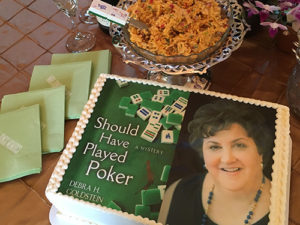 My birthday was in March. It wasn’t a milestone birthday nor did I celebrate it in any special way, but I did receive two cards during my birthday week that I saved because they had quotes I thought might make interesting blog topics. Since March, they have been sitting on a table in my bedroom waiting for me to blog about them. Instead, I stared at them and walked away. That is, until today when I realized the problem was thinking of them separately. They belonged together in one blog.
My birthday was in March. It wasn’t a milestone birthday nor did I celebrate it in any special way, but I did receive two cards during my birthday week that I saved because they had quotes I thought might make interesting blog topics. Since March, they have been sitting on a table in my bedroom waiting for me to blog about them. Instead, I stared at them and walked away. That is, until today when I realized the problem was thinking of them separately. They belonged together in one blog.
The first card has a Maxine like woman sitting next to a cake holding a balloon on its cover with the caption, “I was just reading about how some things get better with age.” Inside the card, the message continues: “Don’t get excited. They were talking about cheese.” The other card has a boy and a dog sitting in a sailboat across from a giant bear who is reading. The quote next to the sailboat is attributed to Mark Twain. “Good friends, good books, and a sleepy conscience: this is the ideal life.” The inside line is simple: “Here’s to never outgrowing good books or good friends!”
I think both cards capture the essence of being a reader and a writer. Think about the classics or some of your favorite books. I can’t tell you how many times I’ve read Harper Lee’s To Kill a Mockingbird and Giant by Edna Ferber. Both hold up, don’t they? Mockingbird was published in 1960, Giant in 1952, but both have messages particularly relevant today. Why do still talk about these books? I want to think it is because they are well-written and address topics of importance, but I realize there are other books that did the same in their day which are no longer in print.
So, what it is about these books that like cheese, they have only grown better with age. I’d like to know your opinion, but to me, it is that their characters seem simple, but each is complex; many are stereotypical in their biases, fears, and behaviors, but they change based upon their experiences and understanding of the times changing around them.
Over the years, I haven’t always agreed with the thoughts and beliefs of my friends, but that hasn’t been a reason to terminate our friendships. We’ve learned to tolerate each other and occasionally to understand what motivates our differences. Perhaps our consciences are a bit sleepy, but for the most part, my friends are readers, thinkers, and doers. Even when we relax, we tend to be involved in things that reflect how we’ve grown or changed in the face of conflict, concerns, family dynamics, political climates, and societal needs.
We may have mellowed a bit, but watch out. Like the cheese that gets tangier, so do we. I’m thankful for my friends, my books, and the influence both have had on me in the journey of life. What more can I ask?
The post Things That Get Better with Age – Cheese, Books, and Friends by Debra H. Goldstein (click for comments) appeared first on Debra H. Goldstein.
June 4, 2017
Guest Blogger: S. Lee Manning – How I became a Rogue Woman Writer (click here for comments)
 How I became a Rogue Woman Writer
How I became a Rogue Woman Writer
By S. Lee Manning
I’ve always loved spy stories. There’s something that has always fascinated me about a secret world, where politics matter, and the stakes are high. Spies exist in a parallel plane to the real world, something like the magical world of Harry Potter. Spies disappear through tailor shops into secret offices. Spies take the corner seat in restaurants to watch everyone. They know what the average person doesn’t know, see what the average person doesn’t see.
But it’s more than that: there’s the moral ambiguity of the best international thrillers– that ask what actions are acceptable even in pursuit of an admirable goal.
So of course my first novel – or at least the first novel I’m willing to admit to writing – was a spy thriller. Kolya Petrov, a Russian-born, American naturalized spy, is betrayed by his own agency for what seems to be a good reason – nevertheless what happens to him as the expected result of the betrayal is morally and actually horrifying.
It was a pretty decent premise and a decent enough novel. An early version won first prize in the New York Mystery Writers of America novice contest.
But I’m a woman. Women have always been spies, working under the radar, and women have always been writers. But for some reason, women writing in the spy genre, like women agents, often wind up operating under the radar.
Several sources informed me that women don’t buy or read spy novels. I was also told by a well-known editor that men wouldn’t buy espionage thrillers written by women, even though I’ve cleverly disguised my gender by using my first initial and my middle name. (Did I fool you? Bet not.) The editor advised me to change my novel from a thriller to romantic suspense. Turn Kolya into a woman.
I refused and marketed the book as written. Five Star offered me a contract for Trojan Horse without my changing anyone’s gender or softening any of the violence. (It’s still not published, but that’s a long story, involving Five Star’s decision to leave the mystery market. I have a new agent and am working on a new novel – but this is best suited for another blog.)
Soon after signing the contract, I met New York Times best selling writer Gayle Lynds, author of such fabulous espionage thrillers as The Book of Spies, The Spy Master, Masquerade, Mosaic, and most recently, The Assassins. She gave me a wonderful blurb and even more importantly gave me a call to talk about my career.
“There’s not many of us,” she told me. “Us” being women writing espionage thrillers.
As hard as it is to publish traditionally for any author – it is harder for women writers of espionage fiction. Once published, it’s harder to get noticed.
A reviewer told me he didn’t like to read women espionage writers. Articles listing authors of espionage fiction often list only men. Advances for women writers of international thrillers tend to be smaller than advances for men writing similar novels. Women’s espionage thrillers may not get the same backing from publishers as those written by men.
So what to do? What women always do – and do well. Organize.
Thus, Rogue Women Writers. It started with Gayle Lynds and Chris Goff, author of Dark Waters and Red Sky, who contacted me a year and a half ago with a plan to take women writers of international thrillers to a new level.
The circle widened to include Francine Mathews, author of many spy thrillers, the latest being Too Bad to Die; Jamie Freveletti, who writes the Ludlum Covert One series as well as her own series featuring chemist Emma Caldridge; Sonja Stone, whose award-winning young adult novel Desert Dark debuted last August; Karna Bodman, author of four international thrillers, the latest, Castle Bravo; and K.J. Howe, whose international thriller The Freedom Broker debuted in January.
We are kickass women. Some of us know how to shoot, and others how to kill with our bare hands. Our various credentials include working as lawyers, spies, journalists, intelligence analysts, and White House insiders, and we’ve joined forces.
Our mission: to change perceptions of international thrillers written by women. To fulfill our mission, we blog together, and we appeared together on panels at Thrillerfest and Bouchercon last year. Most of us will be together again this year at Thrillerfest.
It’a an exciting ride.
The post Guest Blogger: S. Lee Manning – How I became a Rogue Woman Writer (click here for comments) appeared first on Debra H. Goldstein.
May 28, 2017
Guest Blogger: Manning Wolfe – Song Lyrics: Using Them in Books
 Song Lyrics: Using Them in Books by Manning Wolfe (click for comments)
Song Lyrics: Using Them in Books by Manning Wolfe (click for comments)
Writers often include music references in their manuscripts to establish a mood or setting without consideration of the legal issues surrounding their use. Song lyrics are copyrighted, just like books. And, like books, the copyright is created the minute the tune is written, even prior to registration.
When I give my Legal Issues for Authors presentation, use of song lyrics is the number one area of discussion and chagrin at my response to questions. I often hear: “It’s just one line;” or “I’m not planning to sell that many books, how would they know?” I respond: “Even one line is protected by the song writer’s copyright;” and “What if your book is a big hit and the music company holding the rights decides to enforce it?” It’s a vulnerable position to be in. I remind attendees that the same laws that protect their books from being pirated are the laws that protect a song writer’s lyrics.
Fair use: Even if an author squeezes in under the fair use statute (which is very limited for use in commentary, education, or parody), defending that position in a lawsuit may cost more than the book revenues.
Permission: If an author is determined to use particular song lyrics, permission can be obtained by  sending a request to the music publisher and paying a fee. The cost may be higher than revenues from the sales of the books, and the process can be slow and frustrating.
sending a request to the music publisher and paying a fee. The cost may be higher than revenues from the sales of the books, and the process can be slow and frustrating.
Titles in Lieu of Lyrics: In my own writing, I try to find a way to get the same effect from the song lyrics I’ve quoted without using the actual lyrics. Most of the time, I use the song title and the artist’s name, which is acceptable under copyright statutes. For example, if I’ve written:
Boots drove along the highway singing (lyrics omitted).
I’ll replace that with:
Working Man’s Blues was playing on the radio.
“Merle Haggard really knows how to turn a phrase,” Boots thought.
Use of titles is permitted, and the reader can often create the mood of the song in their own mind.
(Note: Use of song titles on the cover or as the title of the book is protected.)
Original Lyrics: Another safe option is to write original lyrics. Often a mood can be created by song lyrics and the reader may feel that they know the song or at least the type of song even if it’s not a classic or current hit.
Public Domain: There are lyrics in the public domain that are free to use and may be appropriate to a scene. Any song published in the U.S. prior to January 1, 1923 is fair game.
~ ~ ~ ~ ~
Manning Wolfe, an author and attorney residing in Austin, Texas, writes cinematic-style, smart, fast-paced thrillers with a salting of Texas bullshit. The first in her series, featuring Austin Lawyer Merit Bridges, is Dollar Signs: Texas Lady Lawyer vs Boots King. The second in the series, out in June of 2017 is Music Notes: Texas Lady Lawyer vs L.A. Baron. A graduate of Rice University and the University of Texas School of Law, Manning’s experience has given her a voyeur’s peak into some shady characters’ lives and a front row seat to watch the good people who stand against them. To request her presentation, Legal Issues For Authors. or to subscribe to her newsletter go to: www.manningwolfe.com
The post Guest Blogger: Manning Wolfe – Song Lyrics: Using Them in Books appeared first on Debra H. Goldstein.
May 7, 2017
Guest Blogger C. A. Newsome – Discovering Your Secret Sauce (click for comments)
Discovering Your Secret Sauce by C. A. Newsome
There is a lot of advice geared to “writing to market.” In my opinion, that leaves you chasing both the 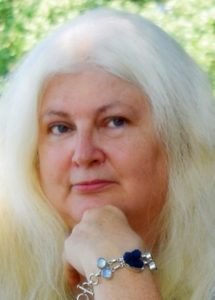 cart and the horse with little likelihood to catch up. You might make a few dollars cloning “Twilight,” “Fifty Shades of Gray,” or Harry Potter, but you’ll have no sustainability after the market moves on and you’ll be back to square one because your backlist will not serve you
cart and the horse with little likelihood to catch up. You might make a few dollars cloning “Twilight,” “Fifty Shades of Gray,” or Harry Potter, but you’ll have no sustainability after the market moves on and you’ll be back to square one because your backlist will not serve you
Better to find your own “secret sauce” and build your own audience.* To do this, you need to do what every breakthrough author has ever done: write what you love. You have to create a premise close to your heart, for four reasons:
Your excitement about what you are writing will carry you through the frustrations that inevitably come with writing a book (and they always come!)
You’ll know enough about this thing that your writing will be believable.
Your love will shine through and engage readers.
You won’t get so sick of the series by book 3 that you hate the idea of writing book 4 no matter how many readers are clamoring for it.
To be successful, you need to find a vehicle for all the things you want to say, one you can come back to year after year. How do you find that concept?
If you read five pages of “Fifty Shades of Gray” and thought, “any idiot can write that,” just stop. If you don’t love and respect a genre, you’ll never understand what pleased the people who made the author wealthy. Instead, take the authors and genre(s) you read the most and the books you read more than once.
If you are truly ready to write a book, you are an avid reader with a slightly jaundiced eye. While 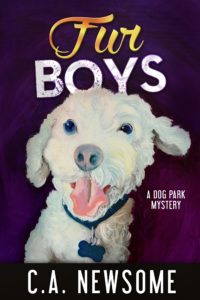 enjoying a book you’re also criticizing or admiring plot twists, the author’s skill, and the nature of the characters. You have random thoughts like, “Somebody should write about a woman who (Fill in the Blank)” and, “If I were a writer, I’d NEVER (Fill in the blank) to my readers.”
enjoying a book you’re also criticizing or admiring plot twists, the author’s skill, and the nature of the characters. You have random thoughts like, “Somebody should write about a woman who (Fill in the Blank)” and, “If I were a writer, I’d NEVER (Fill in the blank) to my readers.”
Make a list of things you think when you’re reading, all the things you’d like to see that you’re missing, all the things you hate and never want to see.
List your favorite authors. What do you love about their books? What makes you roll your eyes? Who have you quit reading and why did you stop?
Think about genre norms. Are there tropes you’d like to blow up, or at least violate? What elements of your genre keep you reading those books?
If you sort through these things you’ll find the elements of your own secret sauce. Focus especially on what you’d like to see in a book that you aren’t finding elsewhere. Pile on everything you gleaned from your lists. Hone this down to your idea of the perfect book.
“But what if nobody else likes it?” Seth Grahame-Smith found an audience for Jane Austen and zombies. If it pleases you, love it enough and it will please someone else.
* The advent of self-publishing makes this increasingly easier to do, as you don’t need to convince an agent, who has to convince an editor, that your book will sell. Instead you can market directly to readers. A quirky premise that won’t sustain the immense feeding chain of a publishing house can provide a nice living for a self-published author.
C. A. Newsome is the author of the Lia Anderson Dog Park Mysteries. Her newest book, Fur Boys is available for pre-order on Amazon at https://www.amazon.com/dp/B0727RFDK1/ . She lives in Cincinnati with a chow-mix street urchin named Shadda and a furry piranha named Gypsy Foo La Beenz. You can find her website at http://canewsome.com and her Facebook author page is https://www.facebook.com/AShotInTheBark/.
The post Guest Blogger C. A. Newsome – Discovering Your Secret Sauce (click for comments) appeared first on Debra H. Goldstein.
Guest Blogger C. A. Newsome – Discovering Your Secret Sauce
Discovering Your Secret Sauce by C. A. Newsome
There is a lot of advice geared to “writing to market.” In my opinion, that leaves you chasing both the  cart and the horse with little likelihood to catch up. You might make a few dollars cloning “Twilight,” “Fifty Shades of Gray,” or Harry Potter, but you’ll have no sustainability after the market moves on and you’ll be back to square one because your backlist will not serve you
cart and the horse with little likelihood to catch up. You might make a few dollars cloning “Twilight,” “Fifty Shades of Gray,” or Harry Potter, but you’ll have no sustainability after the market moves on and you’ll be back to square one because your backlist will not serve you
Better to find your own “secret sauce” and build your own audience.* To do this, you need to do what every breakthrough author has ever done: write what you love. You have to create a premise close to your heart, for four reasons:
Your excitement about what you are writing will carry you through the frustrations that inevitably come with writing a book (and they always come!)
You’ll know enough about this thing that your writing will be believable.
Your love will shine through and engage readers.
You won’t get so sick of the series by book 3 that you hate the idea of writing book 4 no matter how many readers are clamoring for it.
To be successful, you need to find a vehicle for all the things you want to say, one you can come back to year after year. How do you find that concept?
If you read five pages of “Fifty Shades of Gray” and thought, “any idiot can write that,” just stop. If you don’t love and respect a genre, you’ll never understand what pleased the people who made the author wealthy. Instead, take the authors and genre(s) you read the most and the books you read more than once.
If you are truly ready to write a book, you are an avid reader with a slightly jaundiced eye. While  enjoying a book you’re also criticizing or admiring plot twists, the author’s skill, and the nature of the characters. You have random thoughts like, “Somebody should write about a woman who (Fill in the Blank)” and, “If I were a writer, I’d NEVER (Fill in the blank) to my readers.”
enjoying a book you’re also criticizing or admiring plot twists, the author’s skill, and the nature of the characters. You have random thoughts like, “Somebody should write about a woman who (Fill in the Blank)” and, “If I were a writer, I’d NEVER (Fill in the blank) to my readers.”
Make a list of things you think when you’re reading, all the things you’d like to see that you’re missing, all the things you hate and never want to see.
List your favorite authors. What do you love about their books? What makes you roll your eyes? Who have you quit reading and why did you stop?
Think about genre norms. Are there tropes you’d like to blow up, or at least violate? What elements of your genre keep you reading those books?
If you sort through these things you’ll find the elements of your own secret sauce. Focus especially on what you’d like to see in a book that you aren’t finding elsewhere. Pile on everything you gleaned from your lists. Hone this down to your idea of the perfect book.
“But what if nobody else likes it?” Seth Grahame-Smith found an audience for Jane Austen and zombies. If it pleases you, love it enough and it will please someone else.
* The advent of self-publishing makes this increasingly easier to do, as you don’t need to convince an agent, who has to convince an editor, that your book will sell. Instead you can market directly to readers. A quirky premise that won’t sustain the immense feeding chain of a publishing house can provide a nice living for a self-published author.
C. A. Newsome is the author of the Lia Anderson Dog Park Mysteries. Her newest book, Fur Boys is available for pre-order on Amazon at https://www.amazon.com/dp/B0727RFDK1/ . She lives in Cincinnati with a chow-mix street urchin named Shadda and a furry piranha named Gypsy Foo La Beenz. You can find her website at http://canewsome.com and her Facebook author page is https://www.facebook.com/AShotInTheBark/.
The post Guest Blogger C. A. Newsome – Discovering Your Secret Sauce appeared first on Debra H. Goldstein.
April 24, 2017
Malice and Me (click for comments)
 When you read this, I’ll be getting ready to attend my fifth Malice Domestic. Although I didn’t leave the bench until two years later, this conference marks the fifth year of my formal commitment to a writing career.
When you read this, I’ll be getting ready to attend my fifth Malice Domestic. Although I didn’t leave the bench until two years later, this conference marks the fifth year of my formal commitment to a writing career.
Malice is a mystery fan and writer conference. While there, I will wear both hats while appearing on a panel, networking with writers and fans, attending the Sisters in Crime breakfast, having lunch with the Guppies, sharing a drink with the Short Mystery Writers Group, and holding my breath at the banquet hoping nominated friends take home an Agatha. The conference is a busy few days, but it doesn’t end there because invariably I go home having new people I stay in contact with.
The other thing special about the 2012 conference was being invited to be one of the twenty-four authors showcased at the new authors breakfast. I arrived at the room and discovered there were twenty-four round tables each set for ten people. The authors were expected to grab a table and act as its host or hostess, except for the few minutes the author went to the microphone to answer a question and give a book blurb.
My table was in the back of the room. Not being well known, it wasn’t one of the first to fill. Two women, looking for seats together, sat with me when the next table didn’t have room for them. From their faces, I knew they were disappointed at being unable to sit with that author. That changed when I comically handled my interview question. When I returned to the table, I had two devoted fans who I have enjoyed spending time with at each Malice since then. Although I have developed other fans, those two are very special to me.

Since that first Malice Domestic, I have been fortunate to be a panelist or a moderator at every Malice I’ve attended. Between the panels and my seating at the banquets, I have the opportunity to earn fans for Maze in Blue, Should Have Played Poker, and my short stories (this Malice, I’ll be on a short story panel and you can be sure I’ll mention the May/June Alfred Hitchcock Mystery Magazine features, “The Night They Burned Ms. Dixie’s Place,” my first story accepted by AHMM) and I am able to mingle and become a fan and friend of established and starting writers
I love the books I bring home and the memories created, but I treasure the friends I make. That’s what Malice is to me.
The post Malice and Me (click for comments) appeared first on Debra H. Goldstein.



